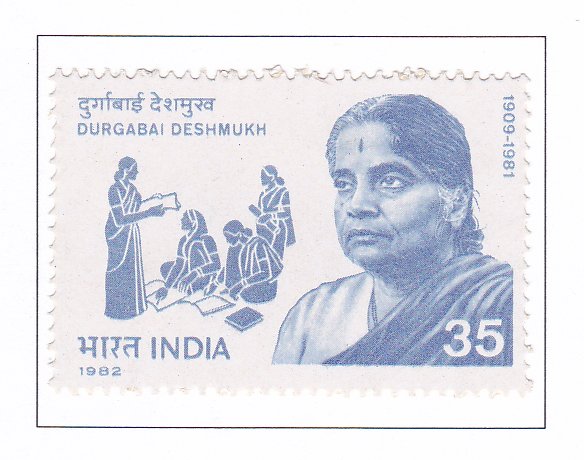1st Death Anniversary of Durgabai Deshmukh (1909-1981)

Technical Data
| Date of Issue | May 9, 1982 |
|---|---|
| Denomination | 35 p |
| Quantity | 2,000,000 |
| Perforation | comb 14½ x 14 |
| Printer | Security Printing Press, Nashik |
| Watermark | No Watermark |
| Colors | Blue |
| Catalog Codes |
Michel IN 907 Stamp Number IN 958 Yvert et Tellier IN 708 Stanley Gibbons IN 1042 |
| Themes | Anniversaries and Jubilees | Famous people | Freedom Fighters | Lawyers-Advocates | Politicians | Reformers | Women |
Dr. (Mrs.) Durgabai Deshmukh, revered as the “Mother of Social Work in India,” left an indelible mark as a multifaceted leader in various spheres of society. Born on July 15, 1909, into a middle-class Andhra family, she was deeply influenced by Mahatma Gandhi from a young age. Displaying remarkable courage and conviction, she joined the Hindi Rashtra Bhasha Prachar Movement at just 12 years old, boycotting English-teaching schools and embracing indigenous practices like spinning on the charkha.
Dr. Desmukh’s commitment to social reform was evident early on. She established the Balika Hindi Pathshala in 1922 and later led marginalized groups like Devdasis and oppressed men from Kakinada to meet Mahatma Gandhi, advocating for their rights and dignity. Her leadership during the Salt Satyagraha in Madras in the 1930s further exemplified her resolve to fight injustice, even in the face of adversity, as she endured arrests and lathi-charges.
Despite her active involvement in the freedom struggle, Dr. Desmukh pursued her education, earning degrees in B.A. (Hons), M.A. (Pol. Sc.), and B.L. She went on to found the Andhra Mahila Sabha in Madras in 1937, which has since expanded to operate hospitals, colleges, schools, and literacy projects, impacting countless lives.
As President of the Blind Relief Association in Delhi, Dr. Desmukh established schools and workshops for the visually impaired, demonstrating her commitment to serving the marginalized. Her tenure as a Member of Parliament was marked by her advocacy for social welfare legislation, leading to the enactment of several laws benefiting the underprivileged.
Dr. Desmukh’s visionary leadership extended to national policymaking, where she played a pivotal role in shaping the Planning Commission’s social welfare agenda. Her efforts culminated in the establishment of the Central Social Welfare Board, which mobilized voluntary organizations to address the needs of women, children, and the handicapped.
In addition to her domestic contributions, Dr. Desmukh’s influence reached international acclaim, earning her accolades such as the Nehru Literacy Award, UNESCO Award, and the prestigious Padma Vibhushan. Her marriage to Dr. C.D. Deshmukh, the Finance Minister of India, further enriched her influence and impact on social welfare initiatives.
The commemorative stamp issued by the Indian Posts and Telegraphs Department pays tribute to Dr. Durgabai Desmukh’s unparalleled dedication and tireless efforts in championing the cause of peace, social welfare, literacy, and empowerment for the downtrodden.
(Text adapted from material courtesy of the Central Social Welfare Board).
